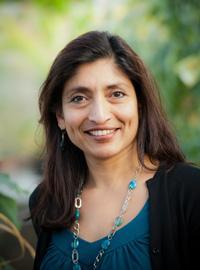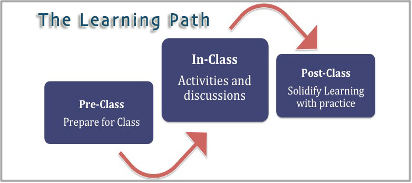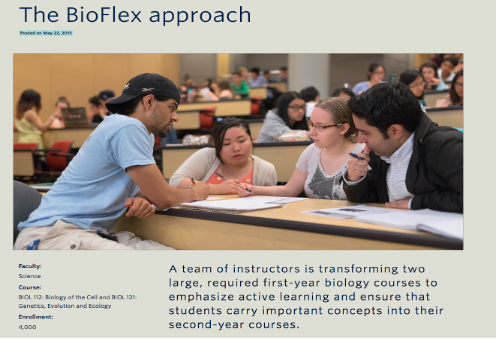
Professor of Teaching
Associate Head of Biology
Academic History
- Certificate on Curriculum and Pedagogy in Higher Education: International Program for the Scholarship of Educational Leadership – UBC (2016)
- Research Associate – UBC (2000 – 2005)
- Postdoctoral Fellow – Washington State University, USA (1997 – 1998) & Max Planck Institute for Chemical Ecology, Germany (1999 – 2000)
- Ph.D. Genetics and Cell Biology – Washington State University, USA (1997)
- B.Sc. and M.Sc. Univ. of Agricultural Sciences, India (1986, 1988)
Contact Information
- chowrira@mail.ubc.ca
- 604-822-5508
- Office: Biological Sciences Building, rooms 1103 and 4007
Awards
- Faculty of Science Achievement Award for Service (2013)
- Killam Teaching Award (2011).
Teaching Interests
“Teaching occurs only when learning takes place.” This statement from Bain (2004) is one of the main guiding principles underlying my learner-centered teaching philosophy, and shapes my practice by paying attention to:
- Learners & their learning: “Learning by doing” – learning is an active process, and learners have to “do” to learn. My lesson plans involve lots of work in the classroom and in exams – working through problem, drawing models, graphs, interpreting data, and working through case studies.

“The learning path” shown, was developed within the Flexible Learning initiative, BioFlex pilot (2013 – 2016), to provide a deliberate and integrated framework for the blended and active-learning experience. This is now widely used across many Biology courses.
Individual and group activities incorporated in the classroom provide many opportunities to practice higher order cognitive skills in a supported environment (Tanner, 2013).

Students engaged in a two-stage collaborative exam. http://flexible.learning.ubc.ca/case-studies/the-bioflex-approach/
- My role as a teacher in supporting the learners and their learning: Learning is a “messy” process (MacKeracher, 2004) and it is the learner who has to “do” the learning. I see my role in this difficult and laborious process to be that of a coach, who instills excitement for the learning, and helps them find the right direction by providing clarity and support in their learning endeavour.
- Fostering an inclusive classroom for all students: As a constructivist teacher, I acknowledge that my students enter the classroom with prior knowledge that is shaped by their culture, lived experiences and previous education (Esteban-Guitart & Moll, 2014). Each student will interpret the content I present differently as they attempt to fit the new material within their current framework of knowledge. As students experience cognitive dissonance (Festinger, 1957) and struggle with accommodating and “fitting” the new knowledge, my role as the teacher is to support and guide them as they construct meaning for themselves in a classroom environment that is safe, inclusive and empowering.
- Scholarship of teaching and learning (SoTL) to sustain learning: I believe that documenting and disseminating practice-based evidence is as important as engaging in evidence-based practice. Discipline-based education research in biology being the current focus of my SoTL work, in close collaboration with my colleagues, I am exploring and assessing the effectiveness of pedagogical approaches such as the productive failure and desired difficulty in deep learning. I provide opportunities for self-regulated learning in my courses by sharing various practices to enhance metacognition.
Courses Taught/Teaching
- BIOL 112: Biology of the Cell
- BIOL 200: Fundamentals of Cell Biology
- BIOL 201: Introduction to Biochemistry
- BIOL 436: Integrated Functional Genomics
- BIOL 535: Teaching and Learning in the Life Sciences
Selected Publications
Peer-Reviewed SoTL Publication
- Sunita G. Chowrira*, Karen M. Smith*, Patrick J. Dubois, and Ido Roll. 2019. DIY Productive Failure: boosting performance in a large undergraduate biology course. NPJ Science of Learning – https://www.nature.com/articles/s41539-019-0040-6. *co-first authors.
“Early failure supports future learning – students first struggled to solve complex problems, which primed them to learn the expert solution via a series of interactive activities – activating prior knowledge, then sifting through the available information, to arrive at a solution. This approach, termed Productive Failure, can lead to significant benefits compared with the more conventional instruction.”
Other SoTL Publications and Presentations
- Oh-McGinnis, R., Deane, T., Taylor, J., Smith, K., Birol, G., and Chowrira, S.G. (2013) Transcription and Translation Concept Inventory. https://q4b.biology.ubc.ca/
- Sunita G. Chowrira, Karen M. Smith, Gülnur Birol. (2018) “The BioFlex approach – Supporting first-year student success in large-class Biology and more.” in the session entitled, “Biology Education and Class Size: Challenges, Opportunities and Strategies for Scaling Teaching” Society for Experimental Biology (SEB) Annual Meeting, Florence, Italy
- Chowrira, S.G. and Smith, K. (June 16 – 19, 2015) Flexible classroom trends in Biology – Promoting active learning with appropriate supportive scaffolding – the BioFlex approach. STLHE Conference presentation, Vancouver
- Chowrira, S.G, Kalas, P., Smith, K., Jeffery, E. (May 2015) The BioFlex Approach – how the trend is catching on…..”Tipping Point” presentation, UBC CTLT Institute
- Chowrira, S.G., Kalas, P., Smith, K., and Jeffery, E. (Nov. 18, 2014) BioFlex Classroom Trends: So addictive and contagious. Science Supper Series presentation, UBC
- Smith, K and Chowrira, S.G. (Nov 14, 2014) Assignment of Learning Activities: Does sequence Matter? A Ninety-minutes interactive presentation at the SITL (Symposium on Scholarly Inquiry into Teaching and Learning) conference, Vancouver, BC
- Roll, I., Birol, G., Kalas, P., Chowrira, S.G. (July 23 – 25, 2014) Is this working? An evaluation framework for teaching and learning in university courses. Workshop (90 minutes) at Improving University Teaching (IUT) Conference, UBC.
References:
- Bain, K. (2004). What the best college teachers do. Cambridge, MA: Harvard University Press.
- Esteban-Guitart, M., & Moll, L.C. (2014). Funds of identity: A new concept based on the Funds of Knowledge approach. Culture & Psychology, 20(1), 31-48.
- Festinger, L. (1957). A Theory of Cognitive Dissonance. Stanford, CA: Stanford University Press.
- MacKeracher, D. (2004) Making Sense of Adult Learning. Toronto: University of Toronto Press.
- Tanner, K.D. (2013). Structure Matters: Twenty-One Teaching Strategies to Promote Student Engagement and Cultivate Classroom Equity. CBE-Life Sciences Education. Vol. 12, 322–331.






